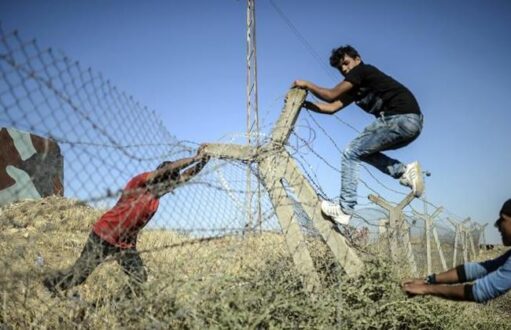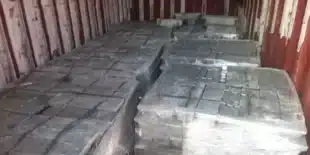MURSITPINAR, Turkey: The siege by ISIS of a largely Kurdish Syrian border town has become a rallying point for Turkey’s Kurds, not just against Sunni insurgents but against the Turkish state, endangering a fragile peace process with Ankara.
Fueled by suspicions that Turkey is supporting the Sunni militants, the Kurds have clashed at Mursitpinar in Turkey with security forces who have fired water cannons and tear gas partly in a bid to prevent them joining the fight across the border in the Syrian town of Kobani.
The growing Kurdish anger toward Ankara poses the biggest threat so far to a historic peace process initiated in 2012 by now President Recep Tayyip Erdogan, an effort to end a three-decade insurgency by militants pushing for greater Kurdish rights.
The conflict has killed 40,000 people, most of them Kurds.
The outlawed Kurdistan Workers Party (PKK) said Ankara had violated a cease-fire, declared by its jailed leader Abdullah Ocalan in March last year, by supporting ISIS.
Commander Murat Karayilan declared the cease-fire “finished” in an interview with a TV station close to the PKK this week.
While Kurdish politicians involved in the process have been more cautious, the allegations of Turkish support for ISIS – strongly denied by Ankara – are widely believed by Kurds on both sides of the border.
“ Turkey won’t allow us to defend Kobani because they support ISIS,” said balaclava-clad Shirwan, 28, holding aloft the red-starred PKK flag as a crowd gathered to protest near the Mursitpinar border gate. “Where is the peace process?”
Deputy Prime Minister Yalcin Akdogan slammed the “ingratitude” of protesters, noting that Turkey had taken in some 150,000 Syrian Kurds fleeing the ISIS onslaught in a matter of just days.
“You have opened your gates, your heart, but on the other side some are constantly fueling tensions. These are not good things for the peace process, they don’t fit with the spirit of the process,” Akdogan said as the protests spread this week.
Another two ministers affirmed Ankara’s commitment to the peace process Friday and said it would not be sidelined by “provocations.”
“We have our own road map. We are leading the solution process, it’s not being shaped by others who want to lead us,” Interior Minister Efkan Ala told reporters.
Kurdish suspicions about Ankara’s relationship with ISIS deepened after 46 Turkish hostages held for more than three months by the group were released Saturday, with no shots fired and no ransom paid.
In an effort to lower the tensions, a delegation from the pro-Kurdish Peoples’ Democratic Party (HDP) has spent the last week meeting top Turkish government officials and PKK leaders in the mountains of northern Iraq.
But in a subsequent statement it piled fresh pressure on the government, criticizing it for failing to put mechanisms in place to enable the two sides to begin advanced talks.
Ankara is sensitive to the risk of the PKK edging toward fresh hostilities, 30 years after it took up arms to try to carve out an independent state in the mainly Kurdish southeast.
“The Kurdish political movement’s abandonment of the peace process and resumption of hostilities in such a chaotic regional atmosphere could drag Turkey rapidly into deep instability,” said political commentator Rusen Cakir.
But he said it would not be logical for the PKK to resume fighting Turkey while involved in conflict in Syria and Iraq, where its fighters played an important role in saving thousands of people from the Yazidi sect fleeing an ISIS advance.
PKK guerrillas began withdrawing to bases in the mountains of northern Iraq in the summer of 2013 under the terms of the peace process, but those moves came to a halt amid militant accusations of Ankara foot dragging on reform.
Many of them fought in Iraq beside Kurdish peshmerga fighters against ISIS last month, while their allies in Syria, the People’s Defense Units, are on the front line there.
The Kurds’ role battling ISIS has raised the PKK’s profile, strengthening its hand in the peace process and making the ultimate goal of disarming the group look more remote.
The boost has triggered efforts to have it removed from lists of terrorist groups in the United States, European Union and Turkey, although such a prospect seems distant for now and fresh conflict in Turkey would end those hopes.
“A movement which resumed conflict with Turkey would risk losing most of the gains which were made by fighting against ISIS, leading to the alienation of those who have started getting closer to them,” Cakir wrote in Vatan newspaper.
The course of the peace process could be determined by the outcome of the conflict between the PKK and ISIS.
“The ideal scenario for Ankara would be the PKK fighting ISIS and neither winning,” said Akin Unver, assistant professor at Kadir Has University. “This way Turkey would be able to dictate its terms to an exhausted PKK in the peace process.”
The latest statement from the PKK leadership in the Qandil mountains of northern Iraq ratcheted up its already fierce criticism of the Turkish government, accusing it of a “declaration of war” on the Kurdish people.
“There is a big explosion of anger and rebellion against Turkey among all Kurdistan’s people,” it said in a statement. “Getting ISIS to attack a small autonomous region like Kobani which only has a frontier into Turkey was the final straw.”
But it will be Ocalan, serving a life sentence on the prison island of Imrali south of Istanbul, who has the final word on the future of the peace process, as PKK commander Karayilan acknowledged this week.
The HDP has applied to the authorities to meet Ocalan but it is not clear when that meeting will take place.
Erdogan has invested considerable political capital in the peace process, facing considerable nationalist opposition to negotiating with a group vilified for decades. He has also gained support for his efforts among conservative Kurds.
The government has pushed through language and cultural reforms to boost the rights of Kurds, who make up some 20 percent of the 77 million population, although Kurdish politicians are pushing for political autonomy and an amnesty for PKK fighters.
Erdogan’s task has been complicated by growing Kurdish assertiveness in the southeast, where several Kurdish schools have opened without permission in a challenge to state authority in recent weeks.
PKK militants have also stepped up what Justice Minister Bekir Bozdag has described as “provocations” including kidnappings, the burning of vehicles and road closures that are aimed at sabotaging the peace process.
The restiveness of Kurds hostile to the state has been raised a notch by the allegations of support for ISIS in Syria.
Some 12 kilometers west of the Mursitpinar border in Syria, Kurdish and ISIS fighters exchanged fire in a weeklong battle over the village of Siftek, as mostly Syrian Kurdish villagers watched from a hillside in Turkey.
“ Turkey is supporting ISIS. They support them because they don’t want the Kurds to be free,” Cuneyt Sohmet, a Kurdish activist from Turkey’s Siirt province, said as gunfire echoed around the hills.
“But if they do that, peace in the region, peace in Turkey will not be possible,” the activist added.


